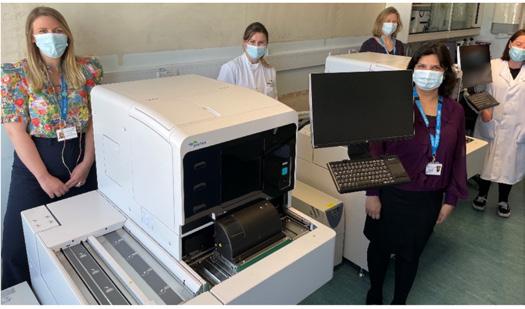
9 minute read
Scientific Trainee Placement
Scientific Trainee placement: Haematology laboratory at the Queen Elizabeth Hospital Gateshead
Over the past 18 months, George Tarpley has completed the scientific trainee internship at Sysmex UK and we are now delighted to announce that George will soon be joining our Haemostasis Team as an Application Specialist. During his time as the scientific trainee, George spent 18 months on a placement at the Haematology Laboratory at Queen Elizabeth Hospital Gateshead, South of Tyne and Wear Clinical Pathology Services.
At Sysmex UK, the development of our young scientists within the industry is something we continue to support through opportunities such as The Carol Briggs Award – the poster competition that is linked with our annual user symposium. Another avenue of support was the scientific trainee internship that George has just completed. As George’s placement comes to an end, and having recently become HCPC registered, we thought it would be great for him to share his experience of the past 18 months as a young scientist and the challenges faced completing his placement during the COVID-19 Pandemic.
Tell us about your educational background before starting as the scientific trainee at Sysmex UK. Prior to commencing the scientific trainee role at Sysmex UK, I had spent 4 years completing a BSc in Human Biology from Loughborough University. During this time, I spent a year in an industry setting as part of the haematology product team at Sysmex UK. Throughout this initial placement at Sysmex UK, I gained exposure to instrument installations and verifications, customer training, software upgrades, software installations, regulatory administration tasks, and experience in the customer support centre to name a few. I was also given the opportunity to support the initial studies of XN blood bank mode in collaboration with the Component Development Laboratory at NHSBT. As a young scientist, the experience I gained during my year in an industry setting primed me for the scientific trainee placement through developing instrument expertise, in particular automated haematology solutions, however at this point I still had no real working experience within a clinical laboratory.
Did you complete any formal educational studies whilst on the scientific trainee programme? During the first 12 months of my placement I completed a PostGraduate Diploma in Biomedical Sciences via distance learning at the University of Ulster, in order to top up my Human Biology BSc for IBMS accreditation. This consisted of four 20 credit modules including Haematology and Transfusion, Clinical Immunology, Medical Microbiology and Clinical Biochemistry. After completion, I then completed the IBMS registration portfolio and after verification gained HCPC registration as a Biomedical Scientist.
What MSC are you doing now and what modules are you taking? I am currently studying an MSc in Biomedical Science via distance learning at Anglia Ruskin University. Modules to date have included: general pathology, moving towards aastery, introduction to management in biomedical sciences and research methods. In year 2 of the MSc I will be studying the epidemiology, pathogenesis, diagnostics and treatment of a chosen topic within the field of haemostasis – with the mind set for these modules to develop my current clinical knowledge and application in my role as a Haemostasis Application Specialist at Sysmex UK. My project topic was selected as ‘a retrospective study to investigate the potential contribution of novel haemocytometric parameters in the differential diagnosis of viral / bacterial infection through routine full blood count analysis’ where data was obtained during my laboratory placement and will be analysed in the near future.
How do you balance your MSc studying schedule with your work schedule? The MSc is entirely coursework based. Time management is critical for the completion of the modules and Gantt planning charts have been utilised over the previous semesters to ensure specific tasks are complete with weekly deadlines. Ultimately part-time study alongside work requires self-sacrifice out of personal time for completion.
Are there any areas of training you would like to focus on next? I would like to further develop my clinical and practical experience with Sysmex haemostasis instrumentation – in particular specialist assays such as fibrinolytic inhibitors, thrombophilia screening and platelet function testing.
In your opinion, how would you describe the characteristics of a good Biomedical Scientist? From my experience, a good BMS is one who pays attention to detail, who can communicate effectively and one who is able to multi-task under pressure. Collaboration between staff members with accurate information is pivotal for maintaining high throughputs, escalating results and handing over information between shifts.
What laboratory skills did you develop during your placement in the role of scientific trainee? Having no prior laboratory experience outside of my academic programme, my laboratory placement exposed me to basic fundamental laboratory skills such as laboratory health and safety, manual handling, data protection, collaboration with patient care teams, sample pre-analytics and more specific skills such as clinical result interpretation, blood film examination, blood grouping,
instrument operation, instrument maintenance, instrument troubleshooting and the familiarisation with quality management systems. The placement also provided me with the opportunity to develop my experience with designing and carrying out research projects, and thus gained exposure and understanding to the NHS ethical approval process and human research authority. During my role as scientific trainee I was also exposed to an annual UKAS inspection and the validation of new blood transfusion analysers – this experience provided great insight to all of the regulatory and quality documentation that is required to meet these standards.
What affect did the COVID-19 Pandemic have on the laboratory you were working in? Did your laboratory experience change at all during the COVID-19 Pandemic? I am confident in saying that the COVID-19 Pandemic had minimal influence on my laboratory experience and if anything provided greater insight into how laboratories and management are required to adapt in the face of change. From the very beginning of the COVID-19 Pandemic it was an inquisitive period for BMS’ where patterns and trends were observed within full blood counts and coagulation screens. Based on initial publications of a COVID-19 associated coagulopathy, the laboratory experienced an increase in the number of D-Dimer requests. The experience of the pandemic to date has been a huge transitional period for the laboratory. At the beginning air flow cabinet hoods were implemented in the absence of literature on transmission routes, initial research into antibody assays, the implementation, validation and verification of additional PCR instrumentation to cope with COVID sample volumes, and the establishment of a new dedicated COVID-19 laboratory. Within the Haematology and Blood Transfusion department, the laboratory actively participated in the research of COVID-19 therapeutics, such as that of REMAP-CAP and RECOVERY trials for the prescription of convalescent plasma. The implication of reducing elective surgery and non-urgent GP appointments led to a significant reduction in sample throughput for the department and facilitated the implementation of reduced shift patterns. Additionally, all IBMS verifications moved to a virtual nature which changed the current methods of IBMS assessment for both registration and specialist portfolios. “Despite the difficulties within the ever changing environment, I hope this has given George a unique perspective on how a laboratory has to adapt to new challenges, alongside the restrictions we face with sometimes very limited resources.” Nicola Keepin, Haematology Technical Manager, South of Tyne and Wear Clinical Pathology Services.
How would you describe the support you received from the laboratory staff during your 18 months as scientific trainee at the Haematology Laboratory in Gateshead? From beginning to end the support provided from the laboratory has been second to none. I completed a thorough and comprehensive training plan with a dedicated training officer, who oversaw all of my additional studies, assessments, portfolio production, feedback and training and competencies. The years of experience and expertise within the laboratory significantly influenced my experience, where senior members of staff were very keen to teach and train new graduates. The Trust has a successful long standing placement programme in collaboration with local universities, where they recruit students every year as part of the sandwich degree and peer-to-peer programmes, and many have later returned as Trainee BMS’. I have established great rapport with the laboratory staff at the South of Tyne and Wear Clinical Pathology Group and have made some life-long friends. Not only did the staff provide training resource they also provided personal support during what was an uneasy time for everyone during the pandemic, especially when relocated away from family. This will forever be a memorable stage during my career. 10. During your time working in the NHS, what have you learnt about the challenges that laboratories are facing? The NHS is highly constrained from a resource perspective and thus any solution that we can implement to save time and resource is greatly favoured. The laboratory staff are working hard with a 24/7 approach 365 days a year so all the more support as a manufacturer we can provide, the better rapport we will establish.
What are your top learning outcomes from working in an NHS Laboratory for the past 18 months? I would say I developed a much greater understanding of laboratory workflows and the resource pressures that the NHS face. This was particularly exacerbated during the pandemic due to track and trace legislation which on occasion resulted in staff shortages and the requirement to readjust shifts and workflows. I also developed a much greater clinical background through exposure to the hospital environment and patient care teams – I would often collaborate with haematology consultants about patient results. I would also state that I received great exposure to quality management systems, their requirements, UKAS inspections and regulatory guidelines that the laboratory must adhere to. Finally, I received some exposure to the work required for the implementation of new analysers and the verification of different assays. “It has certainly given George some experience around risk assessment and enabled George to research how COVID-19 has impacted both haematological parameters and testing strategies particularly around Haemostasis.” Nicola Keepin, Haematology Technical Manager, South of Tyne and Wear Clinical Pathology Services.
Having just completed your placement, do you have any advice for individuals starting their career in the field of biomedical sciences? My advice to anyone early in their career as a BMS, would be to focus on the main objective, for example, completing the registration portfolio, learning essential laboratory skills, and understand instrumentation and their technology. Additionally, I would recommend getting exposure to other duties within the lab, such as implementation projects, new assay verifications, statistical analysis of QC, and academic projects that could add clinical value. For me personally, it was these additional projects and tasks that challenged me the most during my 18 months in the laboratory, and further consolidated theoretical knowledge into practice. Such projects are very relevant for submission to the annual Carol Briggs award at the Sysmex User Symposium – this provides new enthusiastic scientists with a fantastic opportunity to present their work to their colleagues and peers and receive valuable feedback from key opinion leaders and experienced scientists within the field. My final piece of advice to anyone starting their career as a BMS would be to continue to learn from the senior scientists in your laboratory. This is possibly the best available resource available to you when working in a laboratory as these individuals have a wealth of experience. But most importantly, enjoy the developmental stage of your career as it only comes around once. “It has certainly been an interesting time to be on placement! Despite the awful circumstances incurred by the pandemic George has shown himself to be incredibly adaptable and very much part of our hardworking team throughout this hopefully once in a lifetime period.” Nicola Keepin, Haematology Technical Manager, South of Tyne and Wear Clinical Pathology Services.





